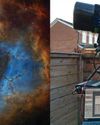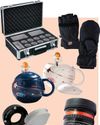
Type: Crater
Size: 96km
Longitude/Latitude: 17° W, 6.1°S Age: Older than 3.9 billion years
Best time to see: One day after first quarter 1 March) or last quarter (13-14 February)
Minimum equipment: 50mm refractor
It is not the clearest of lunar craters, its ringed plain defined by a gently raised rim to the west, appearing broken in form to the east. It forms a characteristic trio with 60km Bonpland and 48km Parry to the south. This pair are ancient too, but presumably younger than Fra Mauro as their rims appear to bulge into Fra Mauro's boundary, inverting the curve of the walled plain's rim. This suggests they were formed after Fra Mauro and overlay its edge.
This story is from the February 2023 edition of BBC Sky at Night Magazine.
Start your 7-day Magzter GOLD free trial to access thousands of curated premium stories, and 9,000+ magazines and newspapers.
Already a subscriber ? Sign In
This story is from the February 2023 edition of BBC Sky at Night Magazine.
Start your 7-day Magzter GOLD free trial to access thousands of curated premium stories, and 9,000+ magazines and newspapers.
Already a subscriber? Sign In

Putting cosmic rays to work
These penetrating interstellar particles have applications from astronomy to archaeology

Set up your first imaging sequence
How to automate and coordinate your gear over multiple nights of imaging

The Universe without gravity
Life with no gravity might sound a fun idea, but as Govert Schilling explains, shutting off this pivotalforce would spell disaster for Earth and beyond

How to blend images taken with different camera setups
Combine data captured at varied focal lengths to create rich, deep images

INSIDE THE SKY AT NIGHT
Back in September 2021, The Sky at Night show spoke to Carly Howett about NASA's then upcoming Lucy mission. As the spacecraft now approaches its main targets - the Trojan asteroids - we check in with her to see how the mission is going

The science of SCI-FI
We love a good sci-fi film, but do they get the science right? Amy Arthur picks six of the big mistakes made in space films

Seeing in a new light
It's National Astronomy Week this month, so take a tip from Mark Westmoquette and let mindful stargazing change your perspective on your life and problems

What to do if you find a meteorite
Ever come across an unusual rock and wondered if it's a meteorite? Mark McIntyre explains how to tell if that stone really is a fragment from outer space

GEAR
Charlotte Daniels rounds up the latest astronomical accessories

Q&A WITH A STELLAR ECLIPSE SPECIALIST
Many stars are gravitationally locked inside multi-star systems, but a rare new triple-star system has set a new record for how cosy these clusters can get